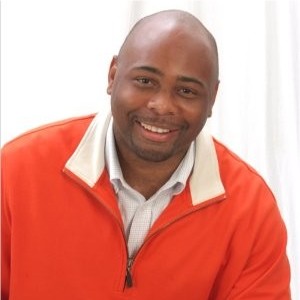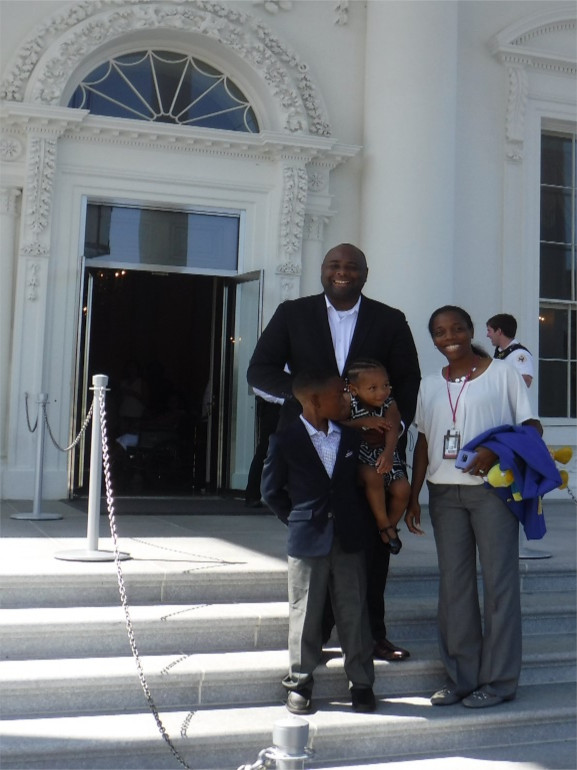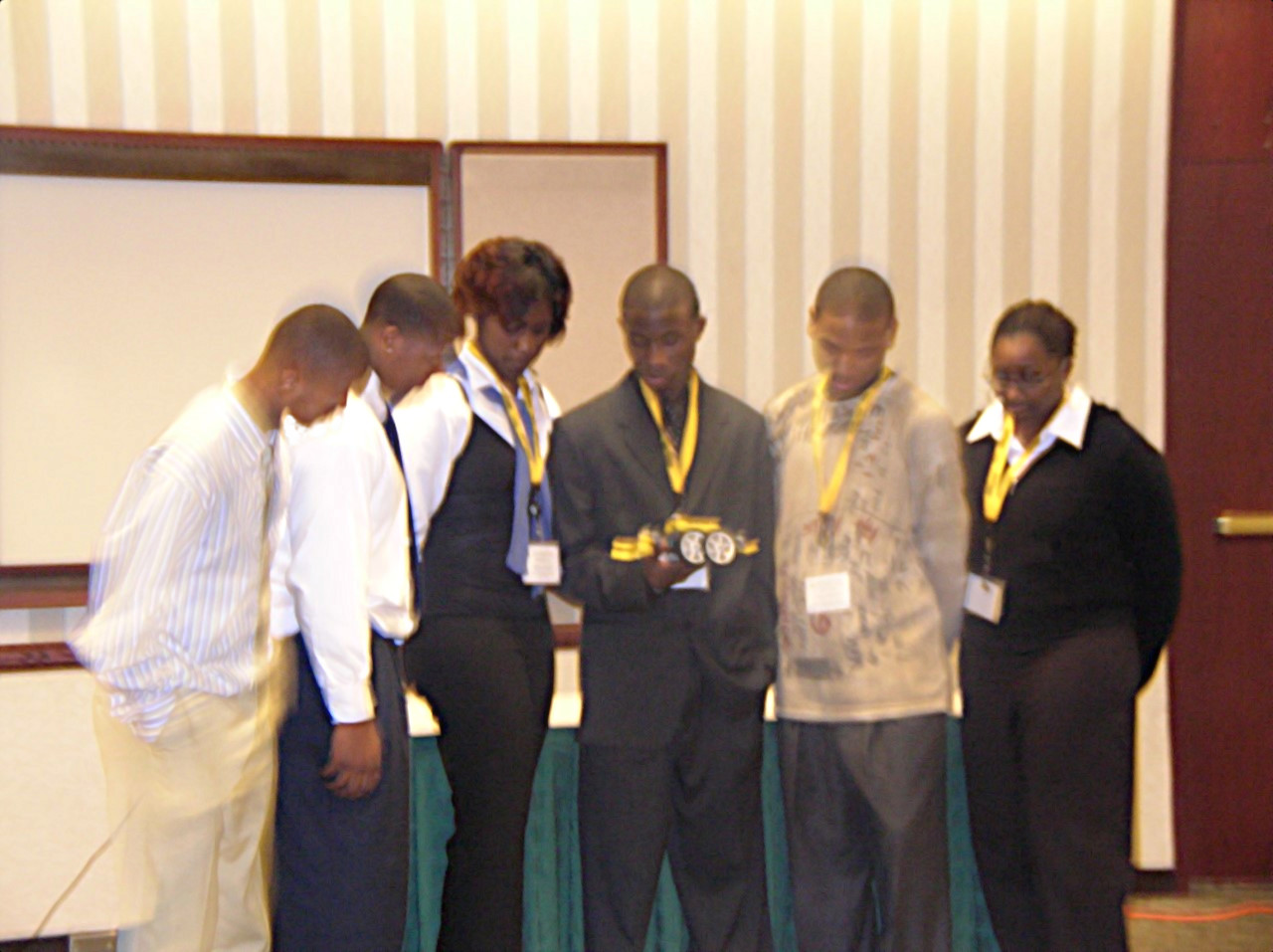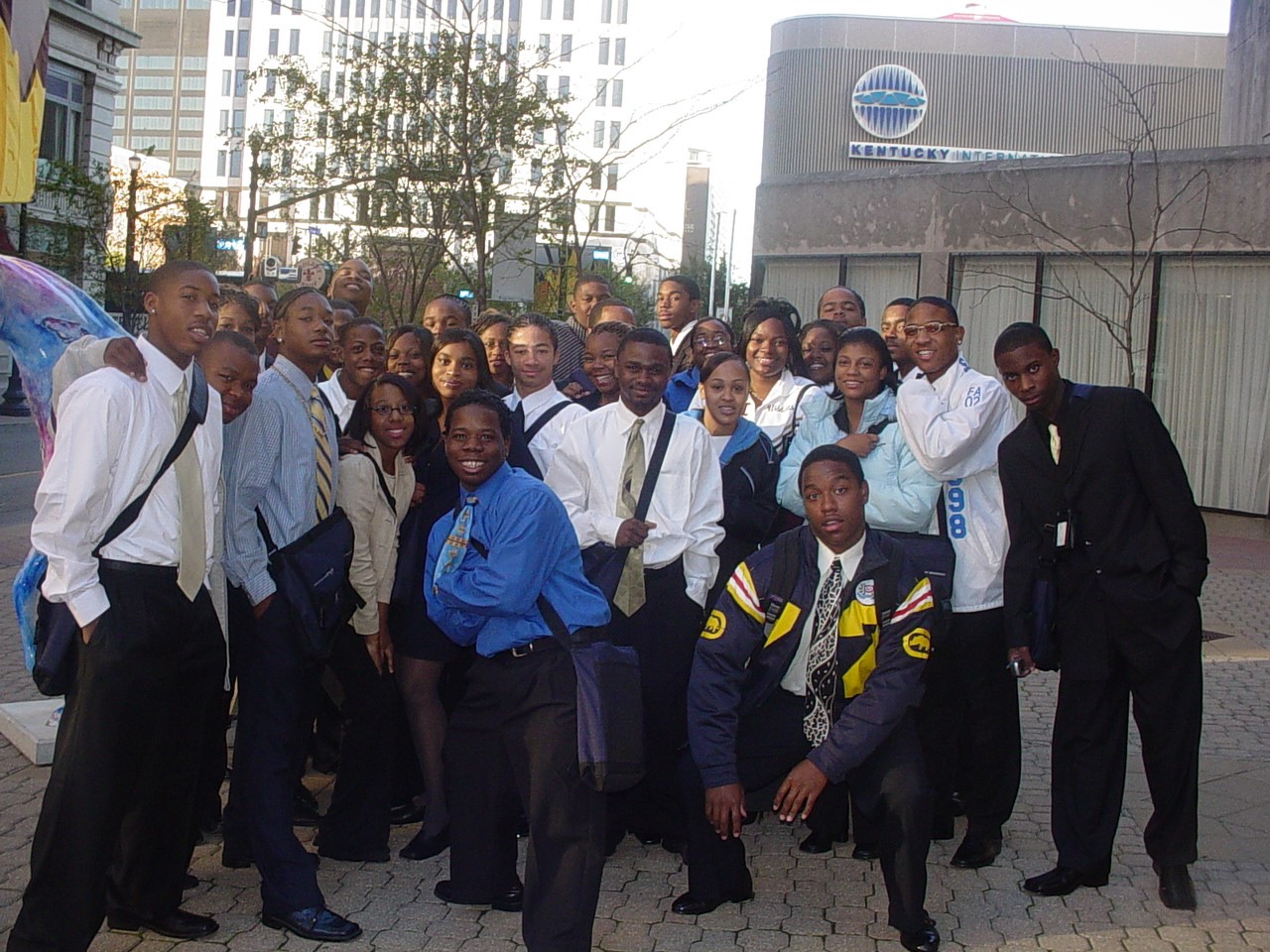Physics
Alumnus Spotlight — Marlon Ridley
 |
Featuring Alumni from the University of Memphis
Department of Physics and Materials Science
Mr. Marlon Ridley is from Nashville, TN and attended Maplewood High School where he took Advanced Placement (AP) classes and Physics. After high school, he went on to earn a Bachelor's degree in Electrical Engineering from the University of Memphis in 2004 and a Master's degree in Physics in 2008. He then started his career in the medical device field and later transitioned into management consulting. During his time at the University of Memphis, he had the opportunity to work at the Biomaterials lab under Dr. Muhammad Shah Jahan. Mr. Ridley currently lives in the Washington DC area with his family. He currently works at Microsoft as an Account Manager and continues community service work through his fraternity Kappa Alpha Psi Fraternity, Inc. For additional information about — or to contact — Mr. Ridley, please refer to his LinkedIn account.
Gustav Borstad: What piqued your interest in physics?
Marlon Ridley: Before I entered college, I heard stories about physics being a tough class that would weed out the weak, but I was fortunate to have Dr. Shah Jahan as my 101 and 102 instructor. He had a unique approach to teaching, taking us to the ESR lab and introducing us to the research and graduate students. They shared the work they did, conferences they attended, and gave us a glimpse into the world of research. I was a freshman, looking for opportunities and I was intrigued by the research being done at the lab. I would stand at the door, observing the experiments, listening to the scientists joke and talk about campus life. It was a remarkable experience, with no lab coats in sight, just real people doing incredible work.
GB: When did you know you wanted to study physics?
Ridley: I was initially pursuing Electrical Engineering, but as I delved deeper into the field, I found myself increasingly drawn to the world of Biomaterials and Physics. My passion for this area was solidified when my first abstract was accepted for presentation at a Research Experience Undergraduates conference. From there, I went on to present my research at conferences across the United States and different countries. Eventually, I realized that I wanted to take my studies to the next level and pursue a graduate degree in Physics. I was fortunate to have supportive professors who encouraged my ideas and helped me bring my vision to life. I will always remember working with Professor Roger V. Lloyd from the Chemistry department, as well as the unwavering support I received from the faculty in both Physics and Engineering. My journey ultimately led me to where I am today, using my creativity and ingenuity to push the boundaries of what is possible.
GB: Were your classes and experiences, particularly at the undergraduate level, what you expected? Or were you surprised by what you learned and experienced?
Ridley: While I had taken some undergraduate classes, the course that truly made a lasting impact was "Mathematical Methods" taught by Professor Marchini, using the textbook by Mary Boas (Mathematical Methods in the Physical Sciences). This class gave me a new level of analytical skills and equipped me with the tools I needed to tackle large, complex assignments with confidence. It was an eye-opening experience that broadened my perspective on the role of mathematics in everything and helped me to see the world in a more methodical and analytical way.
My undergraduate journey through the Physics department was truly something to behold. I took advantage of every opportunity that came my way and made a real impact in the medical field through my work on meaningful research projects. I showed my drive and leadership by working with professors, participating in programs like TLSAMP (Tennessee Louis Stokes Alliance for Minority Participation) and MAPS-GEAR UP (Memphis Ambassador Program Gaining Early Awareness and Readiness for Undergraduate Programs), and serving as a McNair Scholar. My diverse experiences, ranging from being a program manager at the Benjamin L Hooks Institute for Leadership STEM Academy to serving as an advisor to high school students, demonstrate my dedication to education and mentorship. And let's not forget my progressive accomplishments, such as holding national positions in the Society for Biomaterials, being a first author on several research papers, and working at medical device companies in Memphis. Simply put, my undergraduate experience was beyond anything I could have imagined.
 |
| Ridley family visiting the White House. |
GB: If something about the Physics program at the University of Memphis really impacted you positively, what was it and what effect did it have?
Ridley: The Physics program at the University of Memphis was one of great personal discovery of combining science and passion and personal growth. When I first began, I was studying free radical decay in ultra-high molecular weight polyethylene (UHMWPE), but soon found myself exploring new possibilities in cross-linked UHMWPE. But the most significant moment for me came when I had a breakthrough idea on how to introduce an antioxidant to combat the damaging effects of oxygen-induced free radicals. It was a novel concept that had not been widely documented in the literature, and I was thrilled to be able to formulate experiments to test my hypothesis. This experience was a true testament to the power of thinking outside the box and pursuing one's passions.
It was important for me to find curious and authentic support for my idea. A word of advice to any student considering any career or major, finding support for your idea is important because it helps validate and ensure your idea is grounded in solid research. When you have the backing of others who believe in your work, you are more likely to be successful in your pursuit and make a meaningful impact. Moreover, having a network of supportive individuals can help provide you with critical thinking, feedback, and motivation to keep going even when faced with challenges or obstacles. So, having the right kind of support can be crucial in helping you achieve your goals and make a positive difference in the field.
GB: How has studying physics helped you professionally (and even personally!)? Does physics have any effect on your hobbies and personal interests?
Ridley: During this time, I have gained extensive experience in problem solving, strategic thinking, and project management. I have worked with a variety of clients in various industries and have helped them to improve their operations, increase their efficiency, and achieve their goals. I have developed strong communication and interpersonal skills, which have enabled me to effectively communicate with stakeholders at all levels, including C-suite executives, managers, and front-line employees. My work in management consulting has been fulfilling and has allowed me to make a positive impact on organizations and individuals.
I understand the importance of approaching problems from different angles and leveraging diverse expertise to find the best solutions. Physics provides a strong foundation for understanding the underlying mechanics of a problem, and management consulting offers a structured approach to implementation and decision making. By combining these areas of expertise, we can tackle complex problems with confidence, generate innovative solutions, and drive progress forward. Bottom line, you can deliver value in the toughest of circumstances with the most rigid requirements.
GB: What are your past and current professional roles? Has your preparation as a physicist equipped you to pursue and succeed in your desired career path? Did you integrate physics with other skills and disciplines in an interesting or unique way that may inspire students to see physics and its possibilities in a new light?
Ridley: I currently work for Microsoft as a Customer Success Account Manager managing customer programs for Big 4 consulting firms. Being a physicist has allowed me to approach technology problems in a unique and analytical way, utilizing my training in mathematics, critical thinking, and problem-solving skills. My skills as a physicist, including critical thinking, problem solving, and data analysis, enable me to approach complex issues systematically and logically, making me highly valued in the business world. I can apply these skills to a wide range of industries, from aerospace to defense to telecommunications, helping companies make informed decisions and drive innovation. My background in physics has also equipped me to work well in interdisciplinary teams and to communicate complex ideas to non-technical stakeholders, making me an effective leader and problem solver.
Many people have heard of the "smell test", which is a term used to describe the gut feeling or intuition that one has when evaluating a solution or answer. In physics, making approximations is a common practice to simplify complex problems, but it's important to ensure that these approximations still make sense and pass the "smell test." This means that the solution should feel intuitive and not raise any red flags or inconsistencies. Physicists have to strike a balance between accuracy and simplicity in their solutions and the "smell test" helps them ensure that their approximations are still reasonable and trustworthy.
My time in the ESR lab was crucial in my development as a physicist. There, I learned to model free radicals using various methods, a skill that has proven to be a valuable asset in my career. I have used mathematical, system, statistical modeling, and the creation of new data models to provide integrated solutions for clients.
As a physicist, I understand the limitations of experiments, machines, and the problems I am trying to solve. I also know the importance of making inferences from different scientific measurements to gain valuable insights. My flexible and committed approach to problem-solving, along with my critical and systematic thinking skills developed through my experience in Physics, have allowed me to succeed in a range of roles, including research and management consulting.
GB: Do you have any advice for a student who is considering physics as a major?
Ridley: If you're thinking about studying physics, be ready to be challenged, but also be ready to have a lot of fun. Physics can be tough, but it's also incredibly rewarding. You'll learn about the fundamental laws of the universe, and you'll get to apply that knowledge to real-world problems. One of the best things about studying physics is that it trains you to think critically and creatively. You'll be encouraged to approach problems from different angles, and you'll develop a strong ability to analyze data and draw conclusions. Another great aspect of studying physics is that there are so many career paths you can take. Whether you want to work in academia, industry, or government, there are plenty of opportunities for physicists. So, if you're up for a challenge and excited about the idea of exploring the secrets of the universe or the Industrial Revolution 4.0, then physics might just be the perfect major for you!
GB: Do you have any guidance or encouragement for students already in the program?
Ridley: When it comes to your physics classes, it's important to put in the effort and study hard before the semester begins. As a student, you have a unique perspective, and the professors are often experienced enough to accept and appreciate new ideas and alternate approaches to problem solving. I remember a specific example from my time in class where my professor assigned a difficult astrophysics orbital problem as homework for the following week. While many of my classmates wrote code or solved the problem manually, the professor knew there wasn't a straightforward solution. However, one of my classmates who had graduated from the University of Michigan's Math department approached the problem differently and was able to take the solution further than anyone else in the class. This led to the two of us working together on research topics in physics and astronomy. So, my advice is to bring your experiences and perspectives to class. Don't be afraid to share your thoughts and try new approaches to solving problems, especially in the field of physics.
GB: Any other special experiences you want to share?
Ridley: I am proud to share my experience as a mentor to these exceptional young students from Melrose High School. Courtney Robertson, Keith Hammond, and Dr. Darryl Morton may have started with limited exposure to the world of physics, but through our work together, they have been able to unleash their full potential. Their achievements are a testament to the power of exposure and opportunity. In high school, from Courtney’s national science competition win to Keith's success in winning national coding and robotics competitions, to Darryl's recognition in the Physics department, these students have demonstrated their commitment to excellence. They graduated from Purdue in Bioengineering, Doctor of Physical Therapy, and current Principal at Medtronic, I have no doubt that they will continue to make a positive impact in their communities and beyond. It has been an honor to be a part of their journey, and I encourage everyone to invest in the next generation of young scientists, to give them the exposure and opportunities they need to reach their full potential."
 |
 |
|
| Keith, Darryl, and Courtney presenting with the Melrose Robotics Team | 2005 Melrose High School at an Engineering Conference |
GB: Thank you for your time and for the lessons and experiences that you have shared.
Ridley: Thank you.
